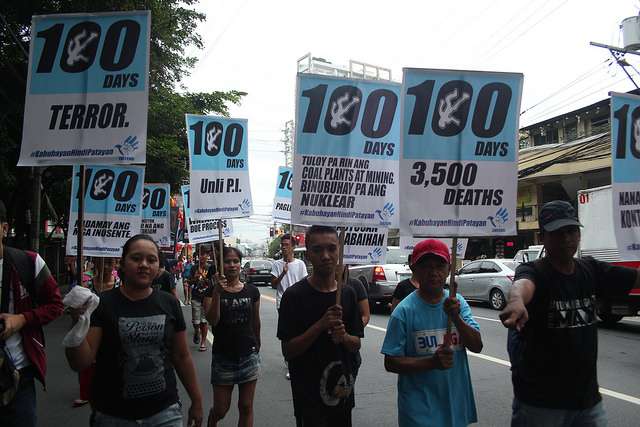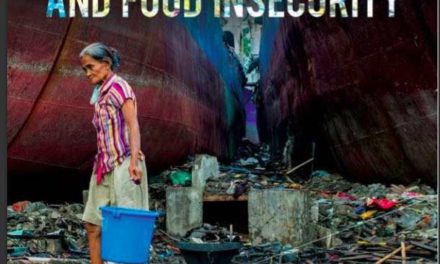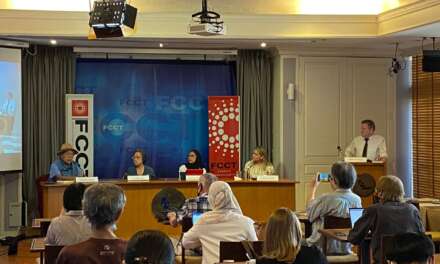In May last year, Rodrigo Duterte was elected to the Philippines presidency, with his ascendancy to power embodying an unravelling of the discourse that has supported the People Power Revolution of 1986. A populist, strongman figure and called as the ‘Executioner’ in Davao (Mindanao) where he had been mayor for several terms, Duterte’s electoral campaign was anchored on the messaging “change is coming,” which responded to the disillusionment of many; the generals sense that nothing hasdchanged in the political and economic situation of the greater number of Filipinos since People Power and that previous elections had only entrenched Philippine elite rule. Duterte has rejected liberal democracy, in which human rights and due process serve as key ideals, as enshrined too in the 1987 Constitution. (In the economic sphere, though, he continues to implement policies following the neo-liberal economic/development paradigm) Authoritarianism is back in mode as epitomized by the following:
· A super majority coalition in both houses of Congress and lack of real opposition,
· Non-recognition of human rights as principle for citizen’s participation and democracy,
· Pending death penalty bills in Congress,
· Culture of impunity especially among security forces,
· Targeting of human rights defenders as enemies of the state,
· Former generals and military people appointed to key government offices,
· Nationalist rhetoric and claims of promoting ‘nationhood’,
· A bloody “war on drugs”, which has claimed 12,000 lives, mostly coming from urban poor communities and use of physical violence as core part of the state’s politics, and
· Anti-women and patriarchal discourse and culture of misogyny and sexism with President Duterte sexually objectifying women, normalizing women-shaming and gender stereotyping to discriminate against women in political and public discourse.
The war on drugs, in particular, has caused worldwide alarm among other governments, civil society, and social movements.
Symbolic and discursive power and Duterte
The economic, political, and socio-cultural promises of People Power/EDSA 1986 remain unfulfilled and social justice, a pillar of the 1987 Constitution elusive. (Though it has to be said that there is no societal consensus on what those promises really are and the ‘change’ that Filipinos want after EDSA.) The rise of Duterte to power can be viewed as a manifestation of peoples’, in particular, the lower and marginalized classes, frustration and disillusionment over the last three decades of elite/liberal democracy that People Power ushered in. By presenting himself as anti-EDSA system, anti-oligarch, ‘leftist’, and anti-imperial Manila, Duterte was able to set himself apart from big-money-backed traditional candidates. Despite his self-professed connection with the Marcoses, who are part of the oligarchy, an overwhelming majority voted for him. I surmise that part of the reason for his victory is the compelling ‘alternative’ narrative he offered, anchored on (i) shaking up the economic system, get rid of mechanisms, rules, and processes which have entrenched inequality, poverty and marginalization into the core of Philippine political economy (e.g. ending contractualization, free irrigation for farmers, specialized hospitals in Visayas and Mindanao, government subsidies for the poor, getting rid of traders and loan sharks in the agricultural value chain); and (ii) fighting drugs and crime and ensuring general peace and order. This narrative contains frames/discourses that determine what Duterte sees as the key issue/problem of the country and the solution/action that he has taken or plan to take. On the promise of shaking up the system, Duterte’s administration is in fact maintaining the status quo and there are many manifestations that he will continue the past administration’s neoliberal economic agenda. For example, his macroeconomic strategy/ policies or ‘Dutertenomics’ focus on increasing free trade agreements, foreign direct investments, PPP schemes, and big infrastructure projects, which may increase the country’s debt burden. He recently allowed Congress to reject the appointment of Gina Lopez, a staunch anti-mining advocate, as Environment secretary; the mining industry’s interests prevailed.
For the second aspect, Duterte is way more consistent. Fourteen out of his thirty electoral promises are about peace and order: he has acted on them starting with his declaration of a brutal ‘war on drugs’, which has claimed more than 12,000 lives, mostly from poor communities, demonization of human rights and identification of human rights defenders as enemies of the state, the push for death penalty, the lowering of the age of criminal liability, and review of anti-wiretapping laws, among others. These are ‘disciplinary’ decrees/actions that crystallize his securitization discourse.
While sectors of society have criticized and opposed these actions and measures, especially the war on drugs, Duterte still enjoys popularity and political and social capital. However, recent surveys show that his popularity decreased among the poor classes but increased among the upper and middle classes. A section of the Philippine traditional left (the Bayan group) also supports Duterte, with three of its leaders now holding posts in the Agrarian Reform, Anti-poverty, and Social Work and Community Development ministries.
From a Foucauldian interpretation, his war on drugs forms a new ‘regime of truth and knowledge’, that the universal principles of human rights are excuses to destroy the country, that some lives are less important than others, that violence justifies the political end of making people feel safe in the night, and trade-offs are necessary.
But are the Filipino people really willing to trade off certain hard-won freedoms such as human rights for this? For how long will Duterte remain popular across classes despite his fascist/authoritarian policies and decrees? Are his supporters not conflicted about the killings, which has surpassed the Marcos dictatorship’s records by more than 100 percent?
To answer these questions, understanding power as discursive and symbolic (in Bourdieu’s sense) offer some conceptual handles. First, the power to spin a new narrative, that all crimes can be attributed to drugs, functions almost as an ideology to organize people’s perception of and their relationship to the world—to everyday life, politics, to the state and to build support for and neutralize/ alienate other narratives, for instance human rights and create social stigma around it. This is why the casualty of the ‘war on drugs’ are not only the 12,000 lives but peoples’ ability to make a stand and defend their rights in the face of real violence. This, in turn, create alternative realities and facts, new regimes of truth and knowledge. This is not about rational analyses or the sharpest lines but who has the ability to sustain a narrative, which can manufacture consent of the population and defuse counter-narratives in the context of contentious politics (Tilly and Tarrow, 2015).
The creation of a mythical figure and narrative is a key element in sustaining this narrative. Duterte projected himself as the father who will end the country’s national ‘chaos’/ problems, which adds to his appeal to many across the class spectrum. His language is couched in paternalistic love that produces a politics of emotive and affective symbolism and not politics of reason. His political and social capital rest on instincts, image, emotions and symbolism that present a different political ensemble than his predecessors (Bello, 2016). He appeals to a lot of Filipinos here and abroad because he taps on deep-seated frustrations, anger, and emotions and channels them into actions via his various wars and fights (war against scalawags/fight against corrupt police, war against the western world, war against mainstream media, etc.). French sociologist Pierre Bourdieu would explain this as the ‘tacit and almost unconscious modes of cultural/social domination happening within the everyday realities of conscious subjects’ (Bourdieu, 1991: 165-167)[1]. If we extend Bourdieu’s symbolic power, Duterte’s minion of trolls and propagandists on social media are imposing categories of thought and perception upon which most Filipinos begin to accept, use, observe and evaluate Philippine society in terms of such categories (e.g. drug addicts are less than human and they deserve to die; all opposition/critics of the President belong to the Yellow-camp/ dichotomies). The social construction of categories and ways of perceiving renders the violence as just/justified, the war on drugs a specter of legitimacy and therefore, perpetuates a social structure that serves the interest of the administration.
Power to the people?
How do you build political power in the context of authoritarianism and fascism-populism? How are poor communities responding to the war on drugs? What will become of grassroots activism in the context of authoritarianism, masked as war on drugs? Will the anti-dictatorship efforts and rallies be sustained and transformed into a political movement?
Let me respond to the point on grassroots activism viz. war on drugs. As posited by one of my colleagues in Focus, people’s abilities to make a stand about their rights are curtailed by the state-sponsored war on drugs and extra-judicial killings. Some local organizers in urban poor communities tell stories of shrinking democratic spaces, of clear and present danger and fear for their lives, and 24/7 surveillance by the police, which make it more difficult for grassroots activism or opposition to flourish. There are emerging local models, however, of how communities trying to defend themselves in the face of such violence. One model is to build local alliances with prominent faith-based leaders, local peoples’ organizations, lawyers, etc. Foremost for local communities that are targets of the Oplan Tokhang (local name of Duterte’s war on drugs) is to work together to access justice for victims, organize for awareness building and vigilance. Some local communities are also aware and wary of the efforts of Kilusang Pagbabago (Movement for Change), the grassroots and village-level political formation being organized by Cabinet Secretary Leoncio ‘Jun’ Evasco to consolidate Duterte’s political base in support for his bid for federalism and to change the 1987 Constitution (to remove the restrictions for foreign investments in land).
Other initiatives are efforts by local executives or mayors to stop Oplan Tokhang or when lawyers were mobilized in to respond to the Philippine National Police’s letter demanding residents to attend an assembly/consultation on war on drugs. As of this writing, too, there is an on-going social movement-led march to defend human rights and resist the pending death penalty bills in Congress. The Catholic Church has joined these forces marching to defend people’s lives.
These efforts speak about various responses and strategies—from resistance to reworking or adapting to the current situation. These further allude to the relation between actors/agency and structure and how even in most repressive situations, local actors find ‘spaces to maneuver’ (Long, 2001) and ‘spaces of indeterminacy’ or grey areas, where the poor and marginalized can exercise claim-making and where agency is possible (Dressler, et. al., 2012). There might be also everyday forms of cultural ‘resistance’, hidden and public transcripts (cf. James Scott’s weapons of the weak) employed by communities under the war on drug that are as important a strategy as collective and planned actions such as mobilizations. New social movement formations have also emerged to provide the much-needed opposition to the administration.
[1] Engels/Marx call this as false consciousness.









